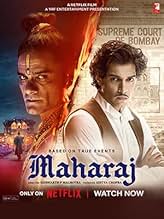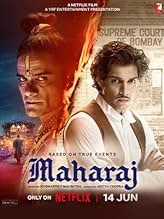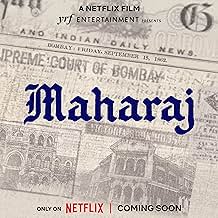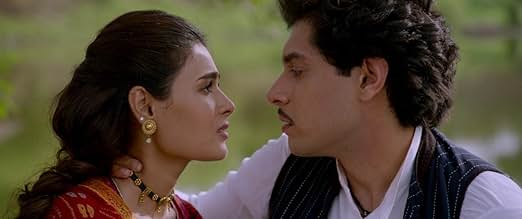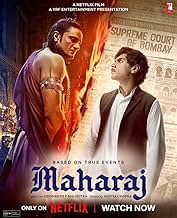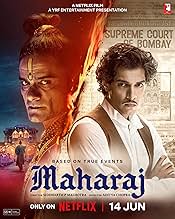CALIFICACIÓN DE IMDb
6.5/10
15 k
TU CALIFICACIÓN
Basado en un caso judicial histórico de la vida real, un audaz periodista cuestiona el comportamiento inmoral de un venerado líder.Basado en un caso judicial histórico de la vida real, un audaz periodista cuestiona el comportamiento inmoral de un venerado líder.Basado en un caso judicial histórico de la vida real, un audaz periodista cuestiona el comportamiento inmoral de un venerado líder.
- Dirección
- Guionistas
- Elenco
- Premios
- 10 premios ganados y 26 nominaciones en total
- Dirección
- Guionistas
- Todo el elenco y el equipo
- Producción, taquilla y más en IMDbPro
Resumen
Reviewers say 'Maharaj' is a historical drama tackling blind faith and social reform, lauded for its narrative and performances. Junaid Khan's debut and Jaideep Ahlawat's antagonist role are highlighted, though opinions on Khan's performance differ. The film's production, cinematography, and historical context are praised, yet some criticize the screenplay and pacing. It's seen as a resonant, thought-provoking piece on truth and justice.
Opiniones destacadas
I watched the movie 'Maharaj', it talks about a very old ritual called "Charan Seva" which is actually very unhuman and we are surprised to know that ritual still exists in different ways.
When some rituals who made by human become religion then majority of devotees accept and follow. Its very difficult to raise our voice against that types of unhuman activities.
How simple man named 'Karsan Dass' raised his voice against?
How to expose and deal with very old unhumnan ritual when all accepted already?
How to hold self believe when every one against with him?
This type of movie we require because some bad rituals still exists in every religion. So don't think that is only one religion problem.
All the department of movie like story, screenplay, Direction, acting are decent and yes because this is first movie of Amir Khan's son Junaid Khan so people's special eyes on this movie too.
When some rituals who made by human become religion then majority of devotees accept and follow. Its very difficult to raise our voice against that types of unhuman activities.
How simple man named 'Karsan Dass' raised his voice against?
How to expose and deal with very old unhumnan ritual when all accepted already?
How to hold self believe when every one against with him?
This type of movie we require because some bad rituals still exists in every religion. So don't think that is only one religion problem.
All the department of movie like story, screenplay, Direction, acting are decent and yes because this is first movie of Amir Khan's son Junaid Khan so people's special eyes on this movie too.
Any who crosses the dignity n sanctity of Vedic injunctions for ulterior selfish motives misusing n misguiding needs to be taught a lesson. That's the theme of the movie. Story revolves around a true historical court case of 1862 in Bombay portraying the fight between a self claimed saint n a social reformer. A socially highly relevant film with an amazing sets, cast n execution. Storytelling has been powerful. Definitely worth a watch. Available on Netflix. My ratings 7/10!
Any who crosses the dignity n sanctity of Vedic injunctions for ulterior selfish motives misusing n misguiding needs to be taught a lesson. That's the theme of the movie. Story revolves around a true historical court case of 1862 in Bombay portraying the fight between a self claimed saint n a social reformer. A socially highly relevant film with an amazing sets, cast n execution. Storytelling has been powerful. Definitely worth a watch. Available on Netflix. My ratings 7/10!
Any who crosses the dignity n sanctity of Vedic injunctions for ulterior selfish motives misusing n misguiding needs to be taught a lesson. That's the theme of the movie. Story revolves around a true historical court case of 1862 in Bombay portraying the fight between a self claimed saint n a social reformer. A socially highly relevant film with an amazing sets, cast n execution. Storytelling has been powerful. Definitely worth a watch. Available on Netflix. My ratings 7/10!
"Maharaj," directed by Siddarth P. Anand, is a compelling historical drama that revisits the landmark Maharaj Libel Case of 1862. With an engrossing storyline, powerful performances, and meticulous attention to historical detail, the film offers a vivid portrayal of a pivotal moment in Indian legal history and society.
Plot Summary The film centers on the Maharaj Libel Case, a significant legal battle in Bombay during the British Raj. The case involves a young journalist, played by Junaid Khan, who exposes the immoral activities of a powerful religious leader from the Vaishnav sect, portrayed by Jaideep Ahlawat. The resulting defamation lawsuit becomes a landmark case, highlighting the clash between truth and power, and the fight for justice and moral integrity.
Acting Performances Junaid Khan delivers a breakout performance as the courageous journalist. His portrayal of a principled young man standing up against corruption and hypocrisy is both compelling and inspiring. Khan's nuanced acting captures the internal struggles and resilience of his character, making his journey profoundly relatable.
Jaideep Ahlawat is equally formidable as the antagonist. His depiction of the charismatic yet morally corrupt Maharaj is chilling. Ahlawat's ability to convey the complexities of a powerful figure facing public scrutiny adds significant depth to the narrative. His performance ensures that the character is not just a one-dimensional villain, but a person with his own vulnerabilities and manipulations.
Direction and Cinematography Siddarth P. Anand's direction is masterful, showcasing his talent for creating a rich, immersive historical setting. His eye for detail is evident in the meticulous recreation of 1860s Bombay, bringing to life the bustling streets, colonial architecture, and socio-political atmosphere of the era. Anand's ability to balance the dramatic courtroom scenes with the broader social context of the time is commendable, making the narrative both gripping and educational.
Historical and Cultural Context The film delves deep into the Vaishnav sect, exploring its beliefs, practices, and the influence of its leaders during the British Raj. Anand presents a balanced view of the sect, highlighting its spiritual significance while also critiquing the corruption that can arise within any institution. This contextual richness adds layers to the story, making it not just a legal drama, but a commentary on the complexities of faith and power.
Set Design and Production Values The set design in "Maharaj" is outstanding, capturing the essence of 19th-century Bombay with impressive authenticity. The attention to detail in the costumes, props, and settings creates a visually captivating experience. The production team's dedication to historical accuracy extends to every aspect of the film, from the grand courtrooms to the modest homes and bustling marketplaces. This meticulous craftsmanship immerses the audience in the period, enhancing the storytelling.
Conclusion "Maharaj" is a powerful and thought-provoking film that excels in both storytelling and historical representation. The performances of Junaid Khan and Jaideep Ahlawat are stellar, bringing depth and intensity to their characters. Siddarth P. Anand's direction ensures that the film is not only a compelling legal drama but also a rich historical tapestry that sheds light on an important chapter in Indian history.
With its engaging narrative, strong performances, and impeccable production values, "Maharaj" stands out as a significant contribution to contemporary Indian cinema. It is a film that challenges, inspires, and transports the audience to a crucial moment in time, reminding us of the enduring struggle for truth and justice.
Plot Summary The film centers on the Maharaj Libel Case, a significant legal battle in Bombay during the British Raj. The case involves a young journalist, played by Junaid Khan, who exposes the immoral activities of a powerful religious leader from the Vaishnav sect, portrayed by Jaideep Ahlawat. The resulting defamation lawsuit becomes a landmark case, highlighting the clash between truth and power, and the fight for justice and moral integrity.
Acting Performances Junaid Khan delivers a breakout performance as the courageous journalist. His portrayal of a principled young man standing up against corruption and hypocrisy is both compelling and inspiring. Khan's nuanced acting captures the internal struggles and resilience of his character, making his journey profoundly relatable.
Jaideep Ahlawat is equally formidable as the antagonist. His depiction of the charismatic yet morally corrupt Maharaj is chilling. Ahlawat's ability to convey the complexities of a powerful figure facing public scrutiny adds significant depth to the narrative. His performance ensures that the character is not just a one-dimensional villain, but a person with his own vulnerabilities and manipulations.
Direction and Cinematography Siddarth P. Anand's direction is masterful, showcasing his talent for creating a rich, immersive historical setting. His eye for detail is evident in the meticulous recreation of 1860s Bombay, bringing to life the bustling streets, colonial architecture, and socio-political atmosphere of the era. Anand's ability to balance the dramatic courtroom scenes with the broader social context of the time is commendable, making the narrative both gripping and educational.
Historical and Cultural Context The film delves deep into the Vaishnav sect, exploring its beliefs, practices, and the influence of its leaders during the British Raj. Anand presents a balanced view of the sect, highlighting its spiritual significance while also critiquing the corruption that can arise within any institution. This contextual richness adds layers to the story, making it not just a legal drama, but a commentary on the complexities of faith and power.
Set Design and Production Values The set design in "Maharaj" is outstanding, capturing the essence of 19th-century Bombay with impressive authenticity. The attention to detail in the costumes, props, and settings creates a visually captivating experience. The production team's dedication to historical accuracy extends to every aspect of the film, from the grand courtrooms to the modest homes and bustling marketplaces. This meticulous craftsmanship immerses the audience in the period, enhancing the storytelling.
Conclusion "Maharaj" is a powerful and thought-provoking film that excels in both storytelling and historical representation. The performances of Junaid Khan and Jaideep Ahlawat are stellar, bringing depth and intensity to their characters. Siddarth P. Anand's direction ensures that the film is not only a compelling legal drama but also a rich historical tapestry that sheds light on an important chapter in Indian history.
With its engaging narrative, strong performances, and impeccable production values, "Maharaj" stands out as a significant contribution to contemporary Indian cinema. It is a film that challenges, inspires, and transports the audience to a crucial moment in time, reminding us of the enduring struggle for truth and justice.
I didnt like the Bollywood style, expected something more refined here since its a historical case. I really liked Junaid's acting at the court scene, somewhere in the middle of the movie he got totally absorbed by the character, and giving it a great finish.
I didn't like the Sharavari's character, was too 80s Bollywood flirty female. Loved the performance of the first actress.
Somehow Jaideep Ahlawat failed to impress me, this is the first time I must say.
Im glad though that this movie was made and really its required for people to understand how carried away they get by religion, customs and traditions.
I didn't like the Sharavari's character, was too 80s Bollywood flirty female. Loved the performance of the first actress.
Somehow Jaideep Ahlawat failed to impress me, this is the first time I must say.
Im glad though that this movie was made and really its required for people to understand how carried away they get by religion, customs and traditions.
After a court case and a string of controversies, the movie dropped on Netflix with minimal promotion. It is a story inspired by true incidents and a case that was widely discussed.
Based on the 2013 Gujarati novel by Saurabh Shah, Karan P. Malhotra's film presents a dramatized account of the landmark 1862 Maharaj libel case. Maharaj filed a defamation case against social reformer and journalist Karsandas Mulji, who exposed his sexual predations disguised as acts of faith.
The story could have been written better. Nevertheless, it keeps you engrossed throughout the narrative. It sets the premise, establishes the characters, and helps you understand the public's blind faith in a godman. The courtroom drama should have been exciting and nail-biting, but with excessive cinematic liberties, it feels highly unrealistic, and the climax takes away the punch it could have delivered.
Set in 1960, the production value is top-notch, making the story highly believable. However, the movie lacks the emotional depth it was supposed to create, failing to make you root for any character. The songs are average and forgettable.
Junaid Khan, son of Aamir Khan, debuts with this movie and was the worst choice for such a strong character. He maintains a single expression throughout the film. On the other hand, Jaideep Ahlawat as Maharaj steals the show. His acting prowess and physical transformation are remarkable, and his calm demeanor makes him both menacing and evil. Shalini Pandey is decent, and surprisingly, Sharvari Wagh, a recent favorite of YRF, has done well, nailing the Gujarati accent.
The film had so much potential with a better screenplay and a stronger lead, but the opportunity is lost. Watch it to learn about the real-life heroes of our country; otherwise, it is just a half-baked work. #pranureviews #Maharaj #MaharajReview.
Based on the 2013 Gujarati novel by Saurabh Shah, Karan P. Malhotra's film presents a dramatized account of the landmark 1862 Maharaj libel case. Maharaj filed a defamation case against social reformer and journalist Karsandas Mulji, who exposed his sexual predations disguised as acts of faith.
The story could have been written better. Nevertheless, it keeps you engrossed throughout the narrative. It sets the premise, establishes the characters, and helps you understand the public's blind faith in a godman. The courtroom drama should have been exciting and nail-biting, but with excessive cinematic liberties, it feels highly unrealistic, and the climax takes away the punch it could have delivered.
Set in 1960, the production value is top-notch, making the story highly believable. However, the movie lacks the emotional depth it was supposed to create, failing to make you root for any character. The songs are average and forgettable.
Junaid Khan, son of Aamir Khan, debuts with this movie and was the worst choice for such a strong character. He maintains a single expression throughout the film. On the other hand, Jaideep Ahlawat as Maharaj steals the show. His acting prowess and physical transformation are remarkable, and his calm demeanor makes him both menacing and evil. Shalini Pandey is decent, and surprisingly, Sharvari Wagh, a recent favorite of YRF, has done well, nailing the Gujarati accent.
The film had so much potential with a better screenplay and a stronger lead, but the opportunity is lost. Watch it to learn about the real-life heroes of our country; otherwise, it is just a half-baked work. #pranureviews #Maharaj #MaharajReview.
¿Sabías que…?
- TriviaDebut of Junaid Khan.
Selecciones populares
Inicia sesión para calificar y agrega a la lista de videos para obtener recomendaciones personalizadas
- How long is Maharaj?Con tecnología de Alexa
Detalles
- Tiempo de ejecución2 horas 11 minutos
- Color
- Mezcla de sonido
Contribuir a esta página
Sugiere una edición o agrega el contenido que falta

Principales brechas de datos
What is the Canadian French language plot outline for Maharaj (2024)?
Responda

